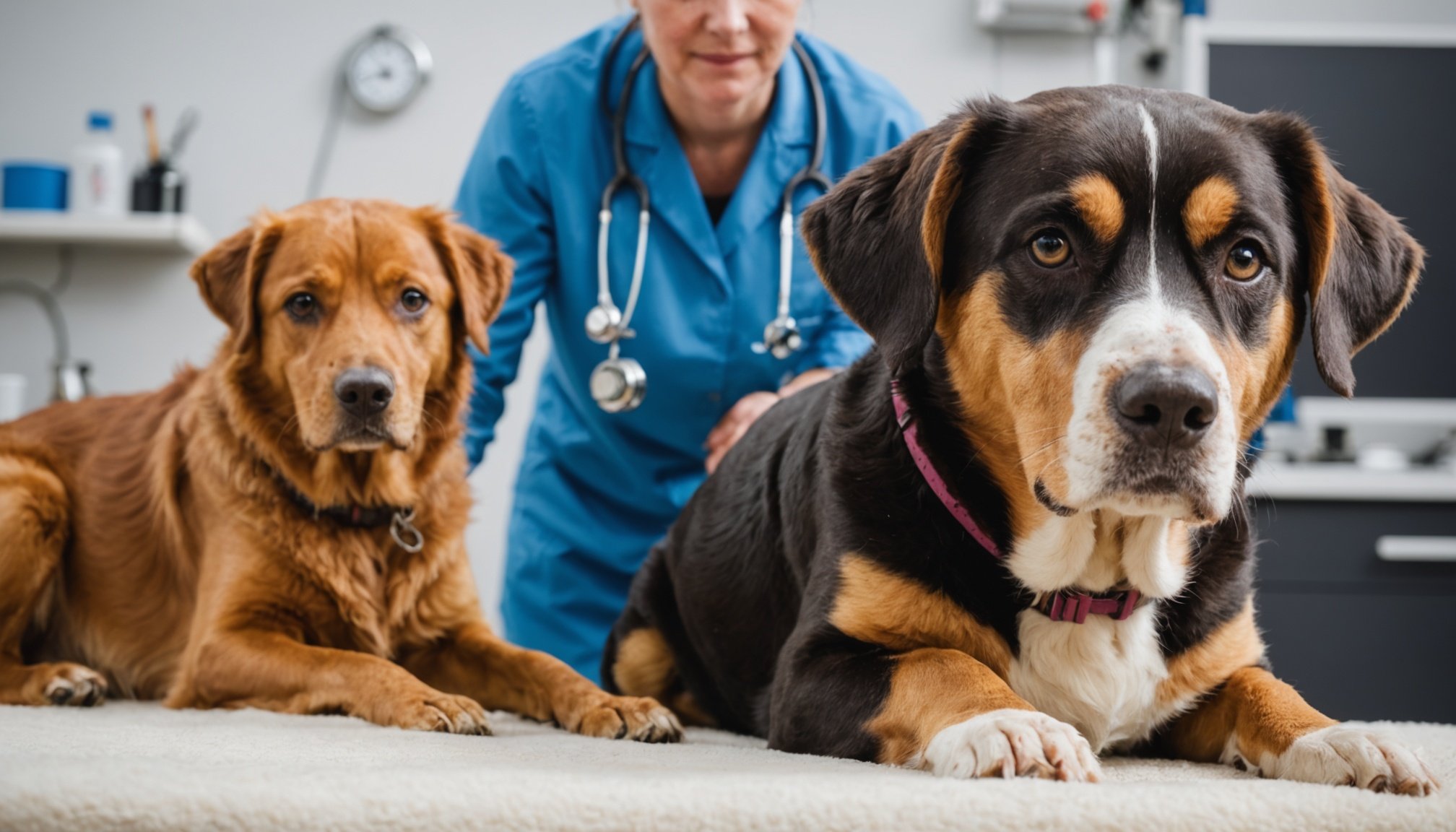Canine lymphoma poses significant challenges for pet owners and veterinarians alike. However, UK veterinary oncologists are at the forefront of innovative strategies that enhance chemotherapy success for affected dogs. This article explores their cutting-edge approaches, from tailored treatment plans to supportive care, aiming to improve outcomes and the quality of life for furry patients. Join us as we unravel these advancements and discover how they transform canine lymphoma treatment.
Overview of Canine Lymphoma Treatment
Exploring the complexities of canine lymphoma treatment requires understanding its types and the role of veterinary oncology. This disease, a common form of cancer in dogs, manifests in various forms such as multicentric, alimentary, mediastinal, and extranodal lymphoma. Early diagnosis is crucial, as it significantly impacts the effectiveness of treatment and the dog's quality of life.
Also to read : Boosting Early Lung Cancer Detection: Innovative Strategies for UK Radiologists
Veterinary oncology focuses on interventions that can extend life and enhance comfort. One primary treatment is chemotherapy, a cornerstone in managing canine lymphoma. The general principles of chemotherapy in veterinary oncology involve using drugs to target and destroy cancer cells while trying to minimize side effects. This approach can lead to remission, allowing dogs to enjoy a better quality of life.
Types of Canine Lymphoma
- Multicentric Lymphoma: Most common, affecting lymph nodes
- Alimentary Lymphoma: Targets the gastrointestinal tract
- Mediastinal Lymphoma: Affects the chest area
- Extranodal Lymphoma: Occurs in organs like skin or eyes
Understanding these types aids in tailoring chemotherapy and other treatments, improving outcomes. The ultimate goal is to offer pet owners informed options, combining expert knowledge with compassionate care.
Also read : Strategies for UK Bariatric Surgeons to Achieve Lasting Success After Weight Loss Surgery
Chemotherapy Protocols Utilized by UK Veterinary Oncologists
The treatment of canine lymphoma involves specific chemotherapy protocols designed by veterinary oncologists to maximize effectiveness and minimize side effects. These protocols often incorporate a combination of drugs, tailored to the specific type and stage of lymphoma.
Commonly Used Chemotherapy Drugs
Several chemotherapy drugs are frequently employed, including:
- Doxorubicin: Known for its potency in inducing remission.
- Cyclophosphamide: Often used in combination regimens.
- Vincristine: Effective in targeting lymphoma cells.
These drugs are part of standard treatment regimens that vary based on individual patient needs.
Standard Treatment Protocols
Veterinary oncologists in the UK may follow protocols such as the CHOP regimen, which includes Cyclophosphamide, Hydroxydaunorubicin, Oncovin (Vincristine), and Prednisone. Variations exist to suit different cases, emphasizing the adaptability of treatment regimens.
Role of Combination Therapies
Combination therapies play a critical role in the success of chemotherapy protocols. By utilizing multiple drugs, veterinary oncologists can enhance the efficacy of treatment, reduce resistance, and improve overall outcomes for dogs with lymphoma.
This structured approach allows pet owners to make informed decisions, ensuring their pets receive the best possible care.
Success Rates and Prognosis in Canine Lymphoma Treatment
Understanding the success rates and prognosis in canine lymphoma treatment is crucial for pet owners making informed decisions. These factors can vary significantly based on several elements.
Statistical Overview
The success rates in treating canine lymphoma with chemotherapy are promising. Approximately 60-80% of dogs achieve remission, with a median survival time of 12-14 months. However, these figures can fluctuate based on the lymphoma type and stage at diagnosis.
Factors Influencing Prognosis
Several factors influence the prognosis in canine lymphoma cases:
- Type of Lymphoma: Multicentric forms generally have better outcomes than extranodal types.
- Stage of Disease: Early-stage diagnosis often leads to more favorable results.
- Overall Health: A dog's general health can impact treatment effectiveness.
Case Studies
Consider these case studies highlighting successful treatment outcomes:
- A 7-year-old Labrador with multicentric lymphoma achieved a 14-month remission following the CHOP protocol.
- A 5-year-old Beagle with alimentary lymphoma responded well to combination therapies, living an additional 18 months.
These examples underscore the potential for positive outcomes, emphasizing the importance of early detection and tailored treatment plans. By understanding success rates and prognosis, pet owners can better navigate the complexities of canine lymphoma treatment.
Patient Management Strategies During Chemotherapy
Managing a dog's health during chemotherapy involves vigilant patient management to ensure optimal care and comfort.
Monitoring Side Effects and Managing Complications
Regular monitoring is crucial to identify and address any side effects. Common issues include nausea, fatigue, and decreased appetite. Veterinary support provides guidance on managing these complications, ensuring the dog's well-being. It's essential to adjust chemotherapy care protocols promptly to minimize discomfort.
Nutrition and Supportive Care During Treatment
Proper nutrition plays a vital role in maintaining health during chemotherapy. A balanced diet supports the immune system and helps manage weight loss, a common side effect. Veterinary support often includes nutritional counseling, ensuring that dietary needs are met. Patient management strategies may also incorporate supplements to enhance recovery and energy levels.
Importance of Owner Communication and Education
Effective patient management relies heavily on clear communication between veterinarians and pet owners. Educating owners about potential side effects and care routines empowers them to participate actively in their pet's treatment. Regular updates and open dialogue foster a collaborative approach, enhancing the overall chemotherapy care process.
- Monitoring: Regular check-ups
- Nutrition: Balanced diet plans
- Communication: Clear guidance and updates
This comprehensive strategy ensures that both the dog and the owner receive the necessary veterinary support throughout the treatment journey.
Recent Advancements in Veterinary Oncology for Canine Lymphoma
Exploring the forefront of veterinary innovation.
Emerging Therapies and Clinical Trials
Recent advancements in veterinary oncology have introduced promising innovative treatments for canine lymphoma. Clinical trials are pivotal, providing insights into new therapies that could revolutionize treatment. These trials often explore novel drug combinations and approaches, aiming to improve remission rates and reduce side effects.
Advances in Personalized Medicine and Targeted Therapies
Personalized medicine is transforming the landscape of canine lymphoma treatment. By analyzing a dog's genetic profile, veterinary oncologists can tailor therapies to the individual, enhancing efficacy. Targeted therapies are also gaining traction, focusing on specific cancer cell mechanisms. These advancements promise more precise interventions, potentially increasing survival rates.
Impact of Technology on Treatment Planning and Outcomes
Technology plays a crucial role in advancing veterinary oncology. Innovations such as 3D imaging and AI-driven diagnostics enable more accurate treatment planning. This precision leads to better outcomes, as therapies can be fine-tuned to the dog's unique condition. The integration of technology not only enhances treatment effectiveness but also supports ongoing research into innovative treatments.
- Personalized Medicine: Tailored therapies
- Clinical Trials: New drug combinations
- Targeted Therapies: Focused interventions
These advancements underscore the dynamic nature of veterinary oncology, offering hope for improved management of canine lymphoma.
The Role of Multidisciplinary Teams in Treatment Success
Exploring the synergy of veterinary collaboration.
Importance of Teamwork
In the realm of veterinary oncology, the role of multidisciplinary teams is pivotal for achieving treatment success. These teams, comprising veterinary oncologists, surgeons, and pathologists, engage in coordinated efforts to devise comprehensive care plans. The expertise of each specialist contributes to a holistic approach, ensuring that all facets of the disease are addressed efficiently.
Case Management and Collaboration
Effective case management involves specialists from various disciplines working in tandem. Veterinary collaboration enhances the diagnostic process, allowing for more accurate treatment protocols. For instance, pathologists provide detailed insights into the cancer type, enabling oncologists to tailor therapies precisely. Surgeons may be involved in cases requiring tumor removal, further contributing to the treatment success.
Enhancing Treatment Effectiveness
The synergy of a multidisciplinary team amplifies treatment effectiveness. By sharing knowledge and strategies, these teams ensure that every aspect of the dog's health is considered. This collaborative approach not only improves the chances of remission but also enhances the overall quality of life for the pet.
- Veterinary Oncologists: Design treatment protocols
- Surgeons: Perform necessary operations
- Pathologists: Provide diagnostic insights
Through veterinary collaboration, the potential for positive outcomes in canine lymphoma treatment is significantly increased.
Case Studies and Testimonials from UK Veterinary Oncologists
Exploring real-world experiences in canine lymphoma treatment.
Detailed Accounts of Specific Cases
Case studies provide invaluable insights into the treatment of canine lymphoma. One notable example involves a 6-year-old Golden Retriever diagnosed with multicentric lymphoma. Treated with the CHOP protocol, the dog achieved a 16-month remission, demonstrating the effectiveness of combination therapies.
Another case features a Border Collie with extranodal lymphoma affecting the skin. Despite the aggressive nature of the disease, targeted therapies led to significant improvement, showcasing the potential of innovative treatments.
Testimonials from Pet Owners and Veterinary Professionals
Testimonials from pet owners highlight the emotional journey and the impact of veterinary care. One owner expressed, "The compassionate support from our veterinary team gave us hope and strength during treatment." Veterinary professionals also share their experiences, emphasizing teamwork: "Collaborative efforts among specialists enhance treatment outcomes."
Lessons Learned and Insights Gained
Real-world experiences yield valuable lessons. A key takeaway is the importance of early diagnosis for improving prognosis. Another insight is the role of multidisciplinary teams in crafting effective treatment plans. These case studies and testimonials underscore the critical role of personalized care in managing canine lymphoma.
Resources for Pet Owners and Veterinary Professionals
Exploring valuable tools and support networks.
Recommended Reading and Authoritative Websites
For those seeking to deepen their understanding of canine lymphoma, numerous resources are available. Recommended reading includes veterinary oncology textbooks and research journals that provide comprehensive insights. Authoritative websites, such as those maintained by veterinary colleges and professional organizations, offer up-to-date information on treatment protocols and advancements.
Support Groups and Forums for Pet Owners
Engaging with support groups and online forums can be invaluable for pet owners navigating the challenges of canine lymphoma. These platforms provide a space to share experiences, ask questions, and receive emotional support from others who understand the journey. Participation in these communities can offer comfort and practical advice, helping owners feel less isolated.
Continuing Education Opportunities for Veterinary Professionals
For veterinary professionals, continuing education is crucial to staying current with the latest treatments and techniques. Opportunities such as workshops, webinars, and conferences enable professionals to expand their knowledge and expertise. These resources ensure that veterinarians are equipped to provide the highest standard of care.
- Textbooks: In-depth exploration of oncology
- Websites: Reliable, expert-driven content
- Support Groups: Community and assistance
- Education: Professional development opportunities
By leveraging these resources, both pet owners and veterinary professionals can make informed decisions and enhance the care provided to dogs with lymphoma.











